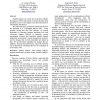Free Online Productivity Tools
i2Speak
i2Symbol
i2OCR
iTex2Img
iWeb2Print
iWeb2Shot
i2Type
iPdf2Split
iPdf2Merge
i2Bopomofo
i2Arabic
i2Style
i2Image
i2PDF
iLatex2Rtf
Sci2ools
COMPSAC
2005
IEEE
2005
IEEE
Parallel Changes: Detecting Semantic Interferences
Parallel changes are a basic fact of modern software development. Where previously we looked at prima facie interference, here we investigate a less direct form that we call semantic interference. We reduce the forms of semantic interference that we are interested in to overlapping def-use pairs. Using program slicing and data flow analysis, we present algorithms for detecting semantic interference for both concurrent changes (allowed in optimistic version management systems) and sequential parallel changes (supported in pessimistic version management systems), and for changes that are both immediate and distant in time. We provide these algorithms for changes that are additions, showing that interference caused by deletions can be detected by considering the two sets of changes in reverse-time order.
COMPSAC 2005 | Parallel Changes | Semantic Interference | Software Engineering | Version Management Systems |
Related Content
| Added | 24 Jun 2010 |
| Updated | 24 Jun 2010 |
| Type | Conference |
| Year | 2005 |
| Where | COMPSAC |
| Authors | G. Lorenzo Thione, Dewayne E. Perry |
Comments (0)

